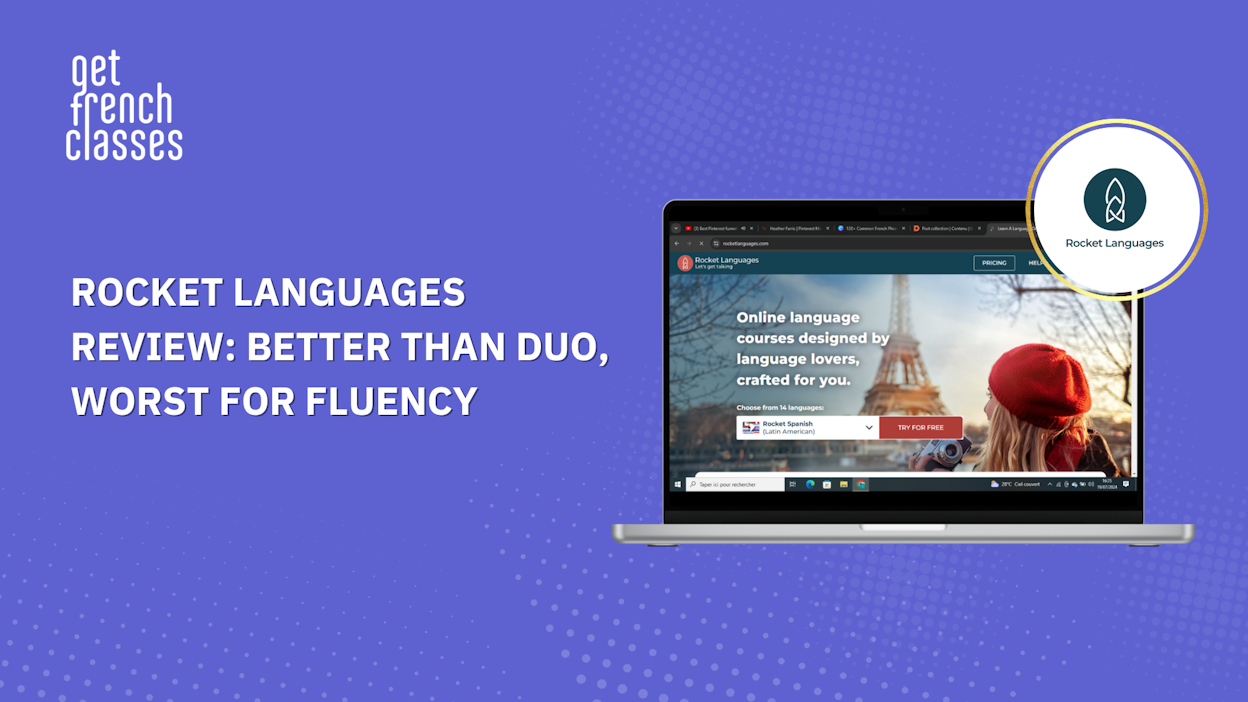In this piece, we're providing an in-depth review of Rocket Languages. But instead of doing like everyone else, we've defined clear criteria against which we're analyzing and reviewing the platform.
Our goal is to give you a comprehensive, unbiased look at Rocket Languages' strengths and weaknesses to help inform your language learning decisions.
What is Rocket Languages? And what's their big promise?
How much does Rocket languages cost? Can you rely on t hem? Hold your horses. And discover more about rocket languages lessons first.
Rocket Languages offers language lessons not from today. Rocket Languages has been offering online courses since 2004. The program provides interactive audio lessons, language and culture lessons, and various learning tools for users to explore 12 languages, including Spanish, French, German, Italian, Japanese, Chinese, and more.

The company's primary promise is to provide an immersive, comprehensive learning experience that helps users develop conversational skills and cultural understanding in their target language.
Rocket Languages claims to “take you from a complete beginner to a confident speaker” by focusing on practical, real-world conversations and grammar explanations that demonstrate how the language actually works.
Some of the key features Rocket Languages offers to fulfill this promise include:
-
Comprehensive audio lessons with native speakers
-
Downloadable lesson materials for offline learning
-
Voice recognition technology for pronunciation practice
-
Gamification elements to keep learners motivated
-
Cultural insights to understand the context of the language
Rocket Languages review: What criteria are we reviewing the app against?
To provide a fair and comprehensive review of Rocket Languages, it's important to establish clear criteria for evaluation.
As an experienced language learner who has used various apps like Duolingo, Rosetta Stone, LingoDeer, and Pimsleur, I'll be assessing Rocket Languages based on the features and qualities I've come to expect from effective language learning tools.
This approach allows for a balanced comparison with other popular platforms in the market.
So, here's what we're going to discuss:
-
Gamification, engagement, and retention
-
Conversational and basic fluency content
-
The UI of the mobile app (Android and iOS)
-
Formats of the different content
-
The desktop interface
-
The ‘My Vocab' tool
-
Spelling and grammar of words
-
Quality of the forum
-
New recording feature
-
The quality and comprehensiveness of Rocket Language's audio
-
Rocket "Extra Testing"
So, let's get into the nitty-gritty of each of these aspects.
Rocket Languages Pros: Why you should give it a try
Here are 9 reasons why Rocket Languages is a great choice for language learning.
-
High-quality, comprehensive audio lessons
The heart and soul of Rocket Languages courses lies in its audio lessons, and after spending countless hours studying with the app, I can confidently say the audio lessons are top-notch.
Each lesson is structured around a conversation, typically 15-20 minutes long, featuring native speakers.
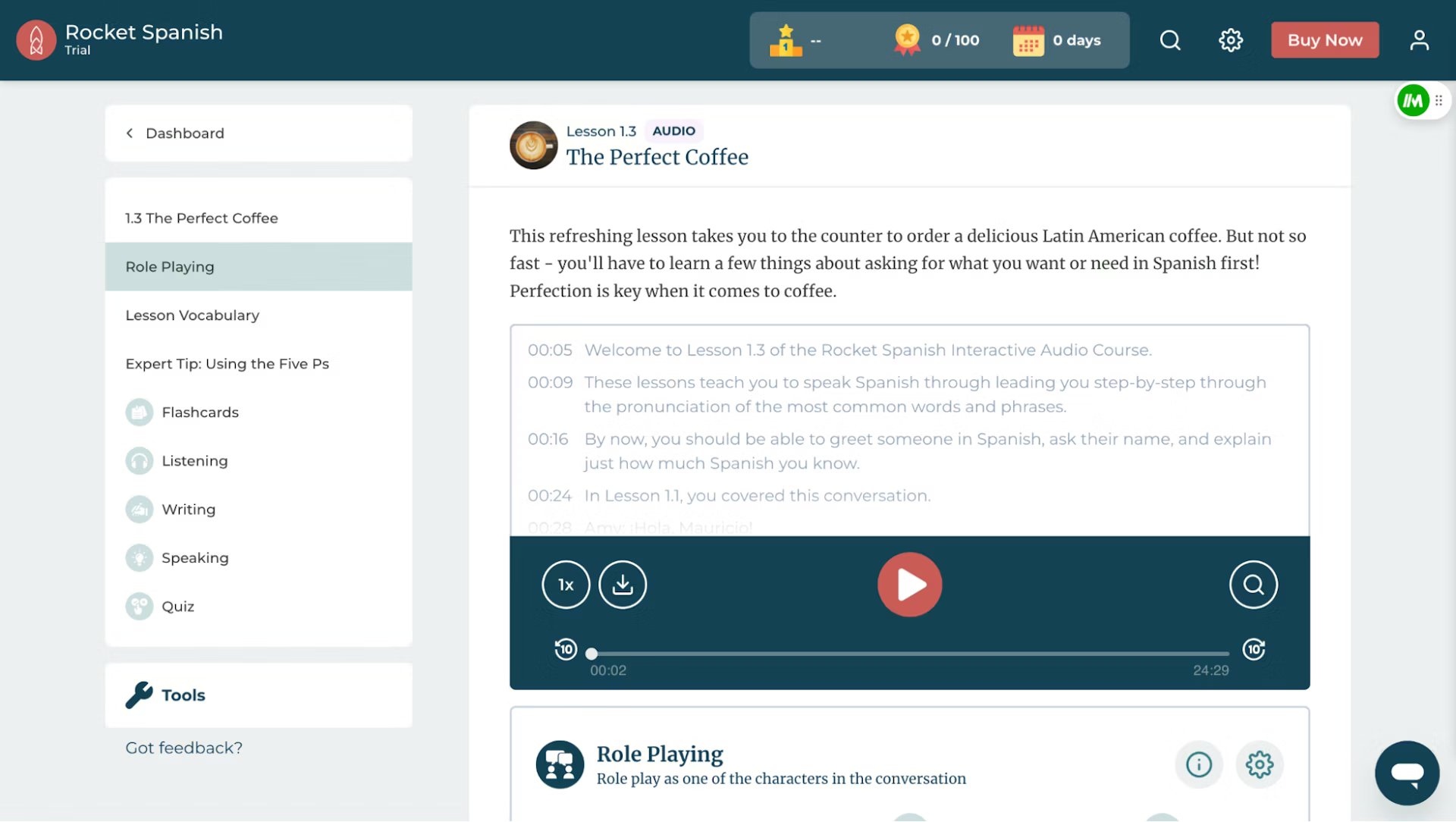
What sets these apart from other apps I've used is the natural flow of dialogue. In the Russian course, for example, I noticed the speakers use colloquialisms and even occasionally stumble or laugh—just like in real conversations.
This authenticity is great for developing an ear for the language as it's spoken.
The lessons are comprehensive, breaking down not just all the vocabulary stuff and grammar lessons but also intonation and cultural context. So you have comprehensive writing lessons as well as cultural lessons.
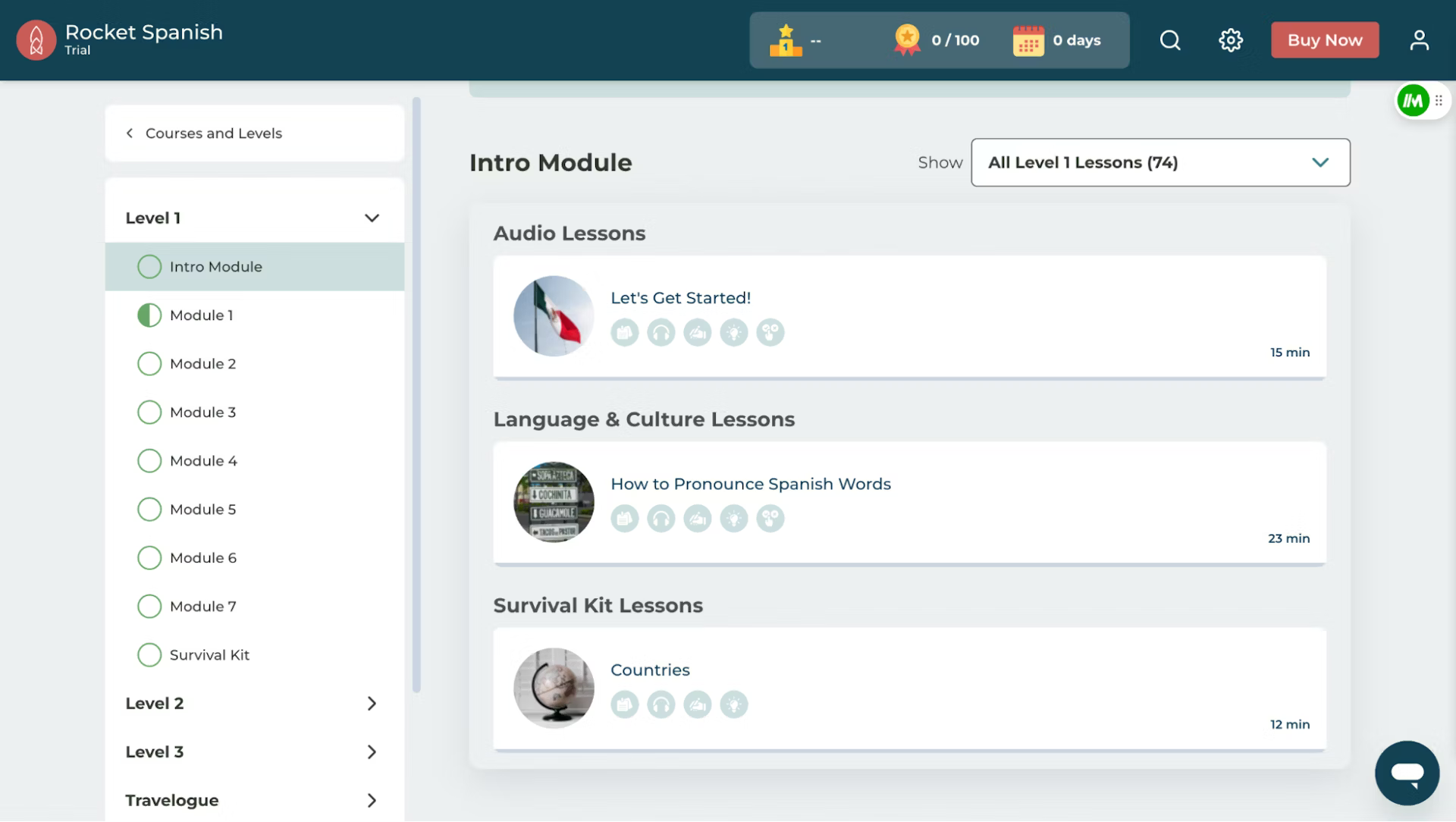
For instance, in the Japanese course, Lesson 2.3 doesn't just teach you how to say "I'm sorry" (ごめんなさい - gomen nasai), but explains the nuances of when to use it versus other apology phrases like すみません (sumimasen).
I particularly appreciate the spiral learning approach. Key phrases and grammar points are revisited and built upon in later lessons.
In the French course, I noticed how the simple present tense introduced in early lessons was seamlessly integrated into more complex past and future tense discussions later on.
However, I did find the pacing occasionally inconsistent. Some lessons, particularly in the early stages, move quite slowly, while others introduce a barrage of new vocabulary that can be overwhelming.
The Arabic course, for example, had a noticeable jump in difficulty around Lesson 4 that took me by surprise.
-
Useful travelogues for practical language learning
Rocket Languages' travelogues are a gem that I didn't expect but quickly came to appreciate.
These are essentially extended audio lessons that simulate real-world travel scenarios, and they're fantastic for the practical application of language skills.
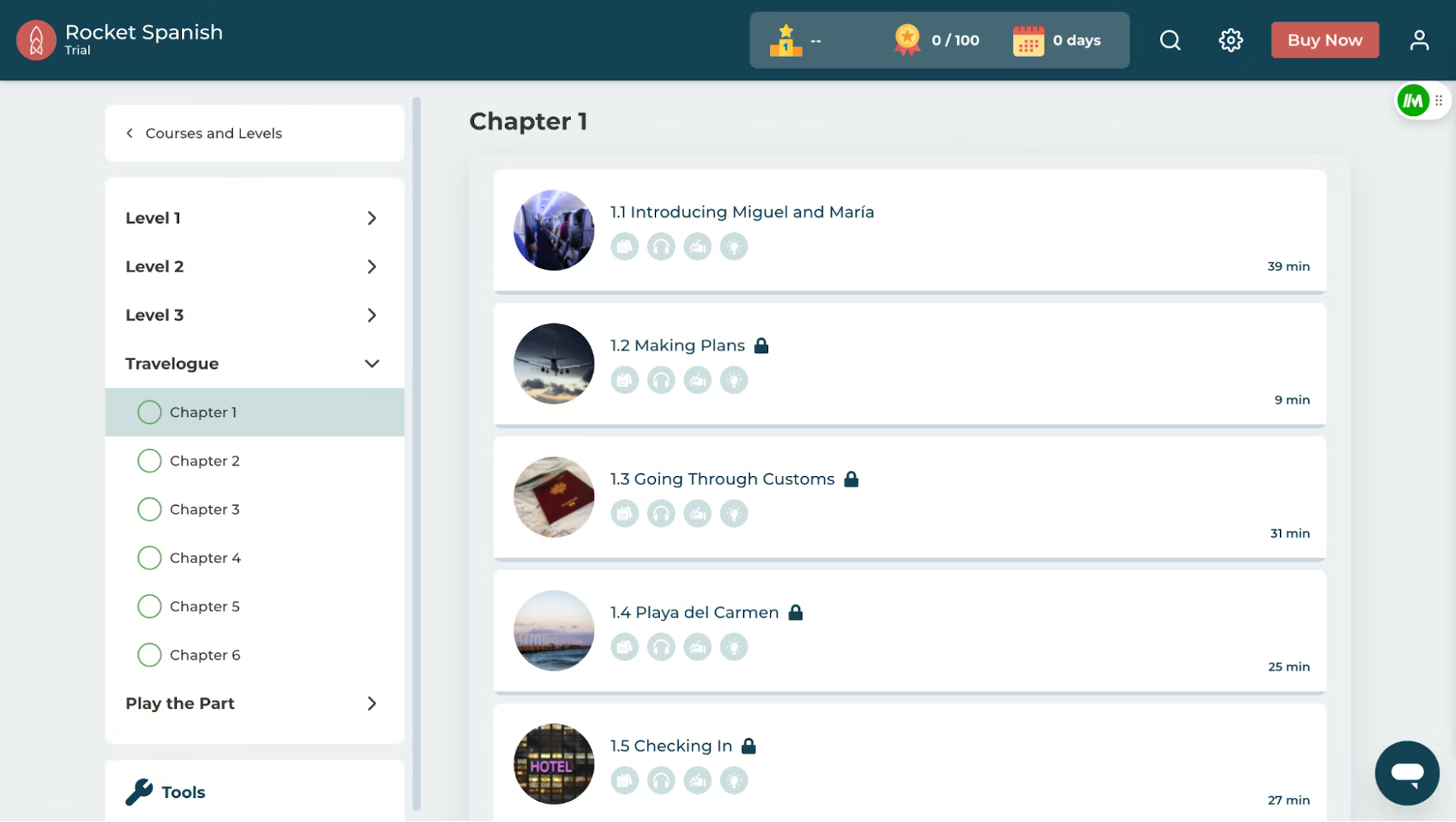
Each travelogue is broken down into several chapters, each focusing on a different aspect of travel.
For example, in the Italian travelogue, you start with "Arriving at the Airport" and progress through scenarios like "Checking into a Hotel," "Ordering at a Restaurant," and "Shopping for Souvenirs."
What I love about these is the level of detail. In the "Ordering at a Restaurant" lesson of the Spanish travelogue, it doesn't just teach you how to order food.
It covers reading a menu, asking about ingredients (crucial for those with dietary restrictions), complimenting the chef, and even how to politely complain if something isn't right. This level of practicality is something I've found lacking in many other language apps.
The travelogues also do an excellent job of incorporating cultural knowledge. In the French travelogue, the "Visiting a Market" lesson taught me not just the vocabulary for various foods but also the importance of markets in French culture and etiquette for interacting with vendors. We're dealing then with French culture lessons. Never forget to prioritize cultural insights, as they are essential when learning any language, including other languages like American Sign Language.
One minor gripe is that the travelogues are only available for some languages (as of my last check, they were available for Spanish, French, Italian, and German). I would love to see this feature expanded to more languages in the future.
Also, while the scenarios are comprehensive, they can sometimes feel a bit idealized. Real-world travel often involves unexpected situations or complications, and I think the travelogues could benefit from including some of these curveballs to better prepare learners.
-
Intuitive and user-friendly desktop and mobile interfaces
After extensively using both the desktop and mobile versions of Rocket Languages, I can confidently say that the user interface is one of its strong suits. The design is clean, modern, and, most importantly, intuitive.
On the desktop, the layout is logically organized. The main dashboard presents a clear overview of your progress, with easy navigation to lessons, tools, and your profile. I particularly appreciate how each lesson is broken down into manageable chunks on the left sidebar, allowing for quick jumps between sections.
One standout feature is the seamless audio integration. Unlike some platforms where you have to download separate files, Rocket Languages embeds audio players directly into the lesson pages. This made my study sessions much more fluid, especially when I needed to replay certain sections.
The mobile app (I tested both Android and iOS versions) maintains the desktop's functionality while adapting well to smaller screens. The touch interface is responsive, and I found the swipe gestures for moving between exercises particularly satisfying. However, I did notice that on some older Android devices, the app occasionally lagged when loading audio files.
One minor gripe: while the overall design is user-friendly, the color scheme (predominantly white and orange) can be a bit bright for night-time studying. An optional dark mode would be a welcome addition.
Syncing between desktop and mobile is nearly flawless. I could start a lesson on my computer and pick up right where I left off on my phone during my commute. This seamless transition between devices is crucial for maintaining consistent study habits.
-
Helpful 'My Vocab' tool for personalized vocabulary learning
The 'My Vocab' tool is a feature that truly sets Rocket Languages apart from many of its competitors. It's essentially a personalized flashcard system, but with some clever twists that make it more effective than your average vocabulary trainer.
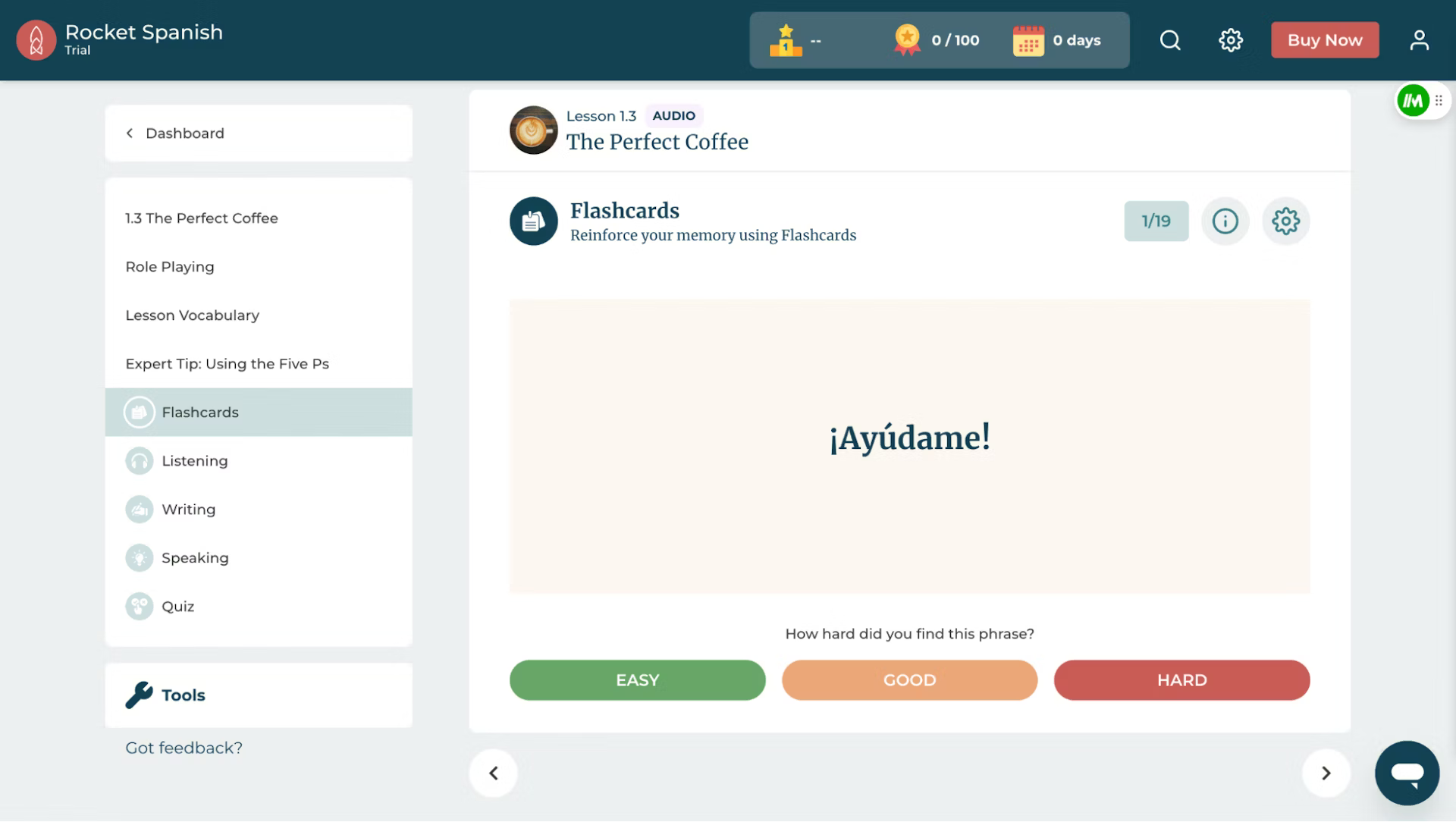
What I love about this tool is its integration with the main course content. As you work through lessons, you can easily add any word or phrase to your 'My Vocab' list with a single click. This allowed me to create a personalized repository of the terms I found most challenging or useful.
The real power of 'My Vocab' lies in its testing features. It doesn't just flip flashcards; it tests your knowledge in four different ways:
-
Recognition (English to target language)
-
Recall (target language to English)
-
Listening (hear the word and type it)
-
Production (see the English and say it in the target language)
This multi-faceted approach ensures you're engaging with the vocabulary from all angles, which I found significantly improved my retention.
For instance, while learning German, I could recognize "Entschuldigung" (excuse me) when I saw it written but consistently stumbled when trying to say it. The production test in 'My Vocab' forced me to practice this, markedly improving my recall.
One particularly useful feature is the difficulty rating system. After each test, you can rate how difficult it was to recall that word. The system then adjusts the frequency with which that word appears in future reviews.
This spaced repetition approach is based on solid memory research, and I noticed it helped me focus more on the words I struggled with.
However, there's room for improvement. While you can create multiple vocabulary lists, there's no option to group words by theme or lesson. This would be helpful for focused study sessions. Additionally, while the mobile app syncs your vocabulary lists, the full testing features are only available on desktops, which can be limiting for on-the-go learning.
-
Active forums for language and culture discussions
The community aspect of language learning is often overlooked, but Rocket Languages has made a commendable effort with its forum feature. After spending considerable time exploring and participating in these forums, I can say they add significant value to the learning experience.
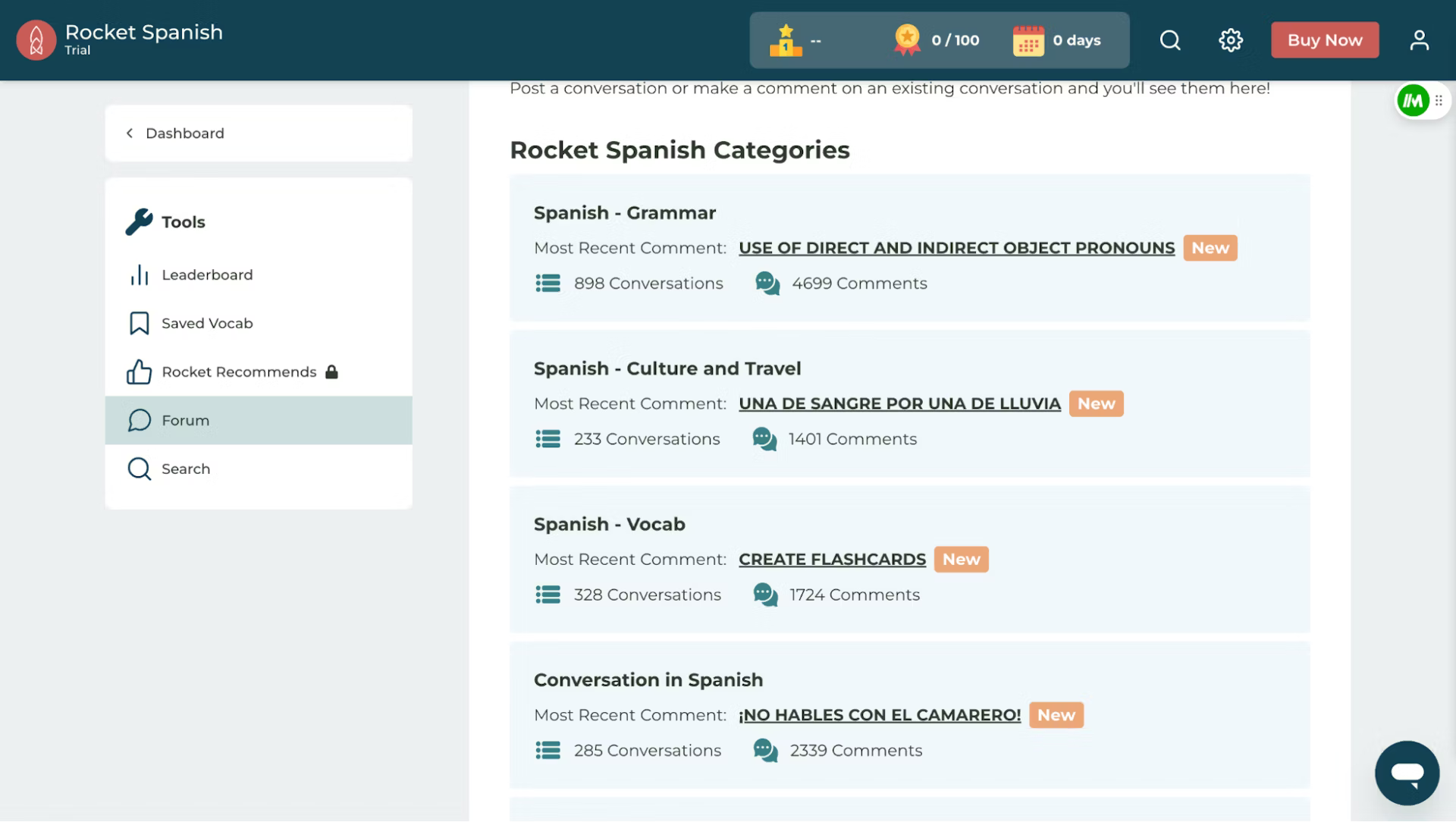
Each language course has its own dedicated forum, which is further divided into sub-forums for grammar questions, vocabulary discussions, and cultural topics. This organization makes it easy to find relevant conversations or start new ones.
What impressed me most was the active participation of Rocket Languages' tutors and language experts. In the Spanish forum, for example, someone posted a question about the subjunctive mood and received a detailed, helpful response from a tutor within 24 hours. This level of expert interaction is something I haven't seen on many other language-learning platforms.
The culture sub-forums are particularly enlightening. In the Japanese forum, I found fascinating threads about everything from proper onsen (hot spring) etiquette to the nuances of gift-giving culture.
These discussions, such interactive exercises, provide valuable context that goes beyond what's covered in the standard lessons.
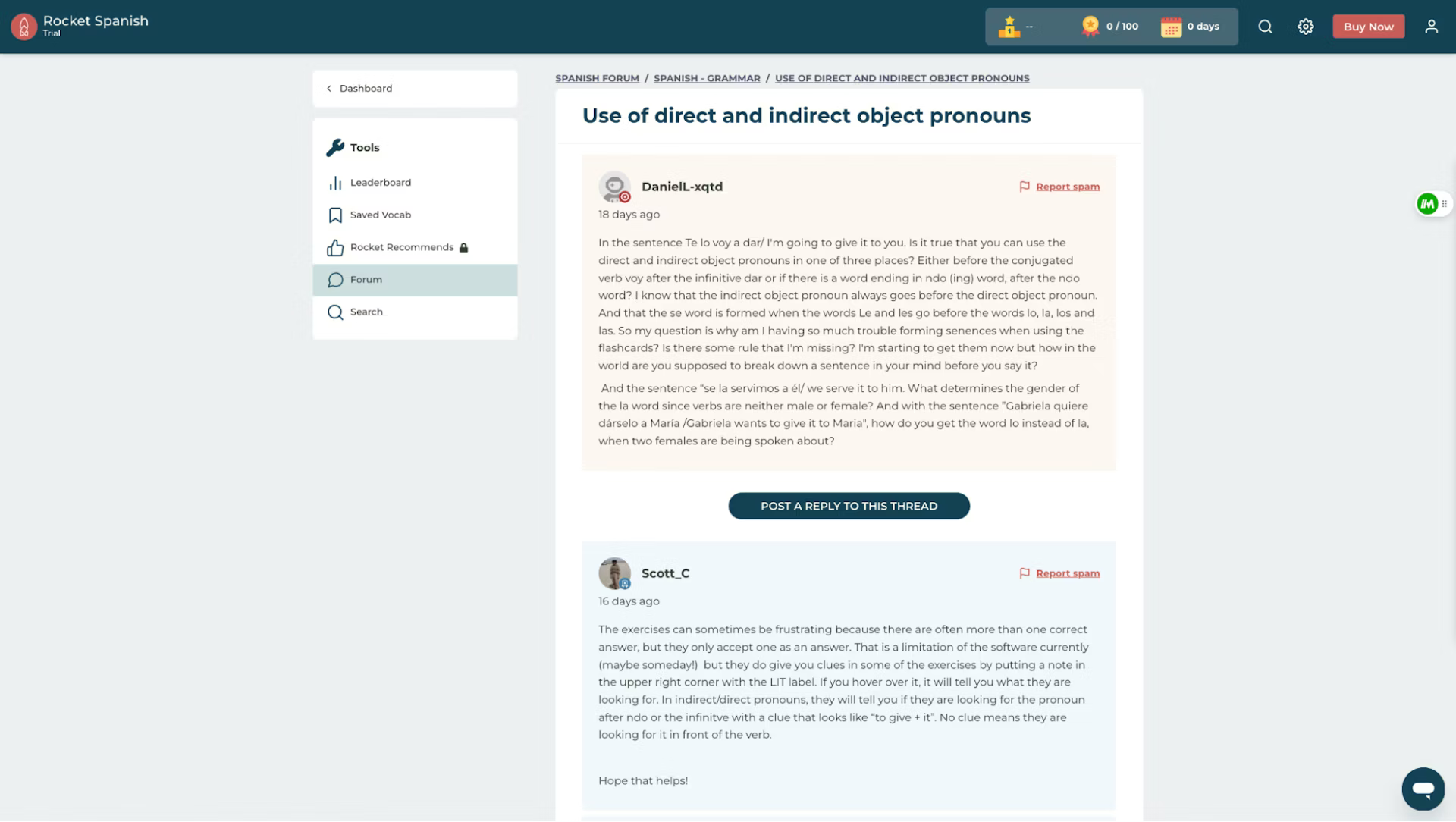
I also appreciate the sense of community fostered in these forums. Learners at various levels interact, sharing tips, encouragement, and even organizing language exchange partnerships. In the French forum, I connected with a fellow learner for weekly conversation practice, which has been invaluable for improving my speaking skills.
However, the forums aren't without their drawbacks. Activity levels can vary significantly between languages. While the Spanish and French forums are bustling with daily activity, I found the Arabic forum to be less active, with some threads going days without responses.
Also, the search function could use some improvement. It's often difficult to find specific topics, especially in more active forums where older threads get buried quickly.
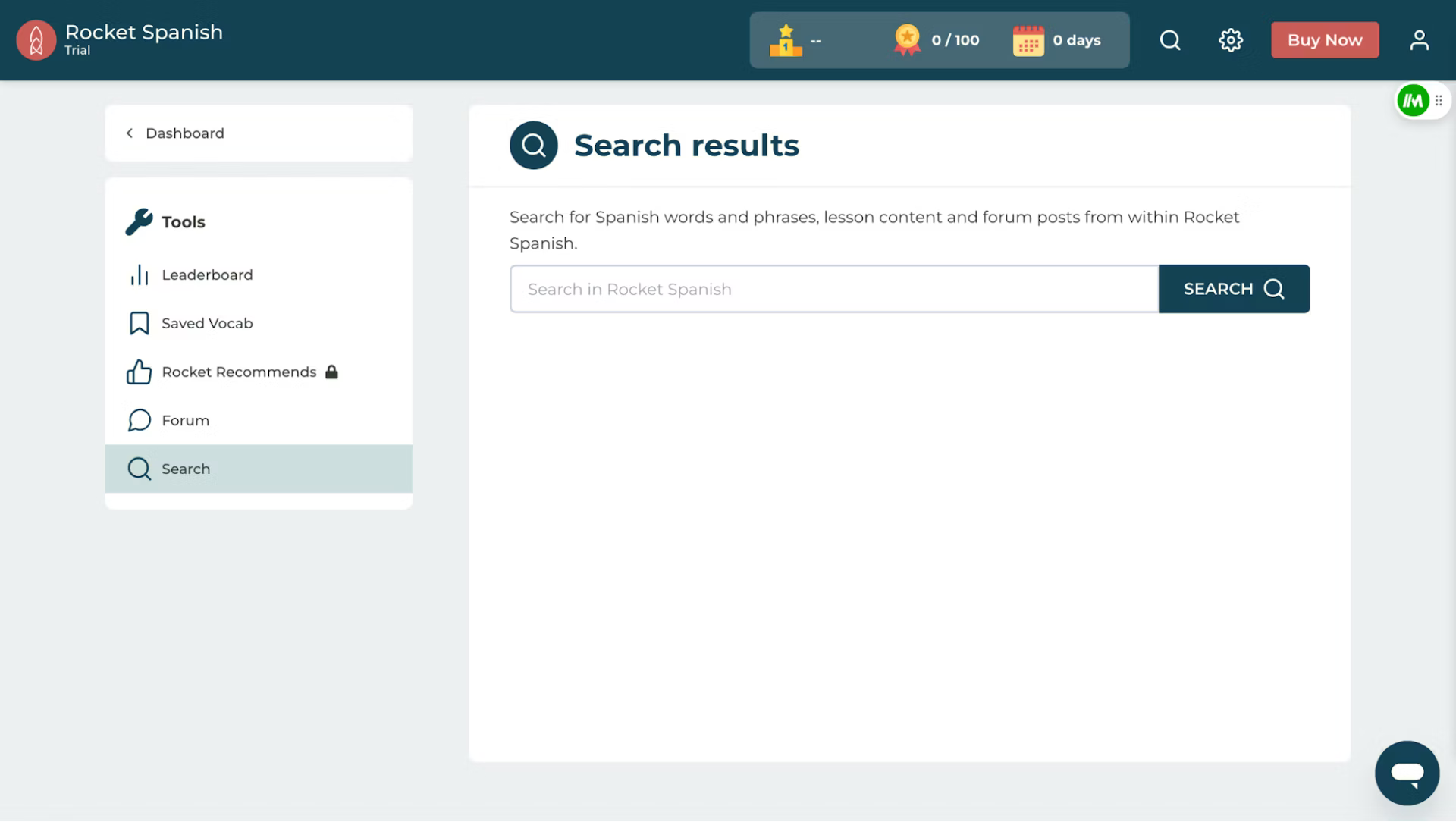
-
Accurate voice recognition using Google Web Speech API
After extensively testing this feature across multiple languages, I can confidently say it's one of the most accurate and responsive systems I've encountered.
The voice recognition is seamlessly integrated into various exercises, particularly in the 'Hear It! Say It!' and 'Know It!' sections.
What sets this apart from other language learning apps I've used is its ability to recognize and process natural speech patterns rather than requiring robotic, over-enunciated pronunciations.
For instance, when practicing Spanish, I intentionally spoke with a slight American accent (as many learners naturally would), and the system was still able to accurately recognize my speech. This is crucial for building confidence in real-world speaking scenarios.
The system's error tolerance is impressively balanced. It's forgiving enough to not discourage learners but strict enough to promote improvement.
In the Japanese course, it caught my mispronunciation of つ (tsu) as す (su) - a common mistake for English speakers - and prompted me to try again.
One particularly useful feature is the ability to adjust the difficulty of the voice recognition. In the easiest setting, it's quite forgiving, which is great for beginners. As you progress, you can increase the difficulty, pushing yourself to refine your pronunciation.
However, it's not without its quirks. In environments with background noise, accuracy can decrease significantly. Also, for tonal languages like Mandarin, I occasionally struggled to differentiate between tones accurately.
-
Conversational and basic fluency content
Rocket Languages makes bold claims about developing conversational skills, so I dug deep into their content to see if they deliver.
The cornerstone of their approach is the interactive audio lessons. Each lesson is built around a practical conversation, which is then dissected and explained.
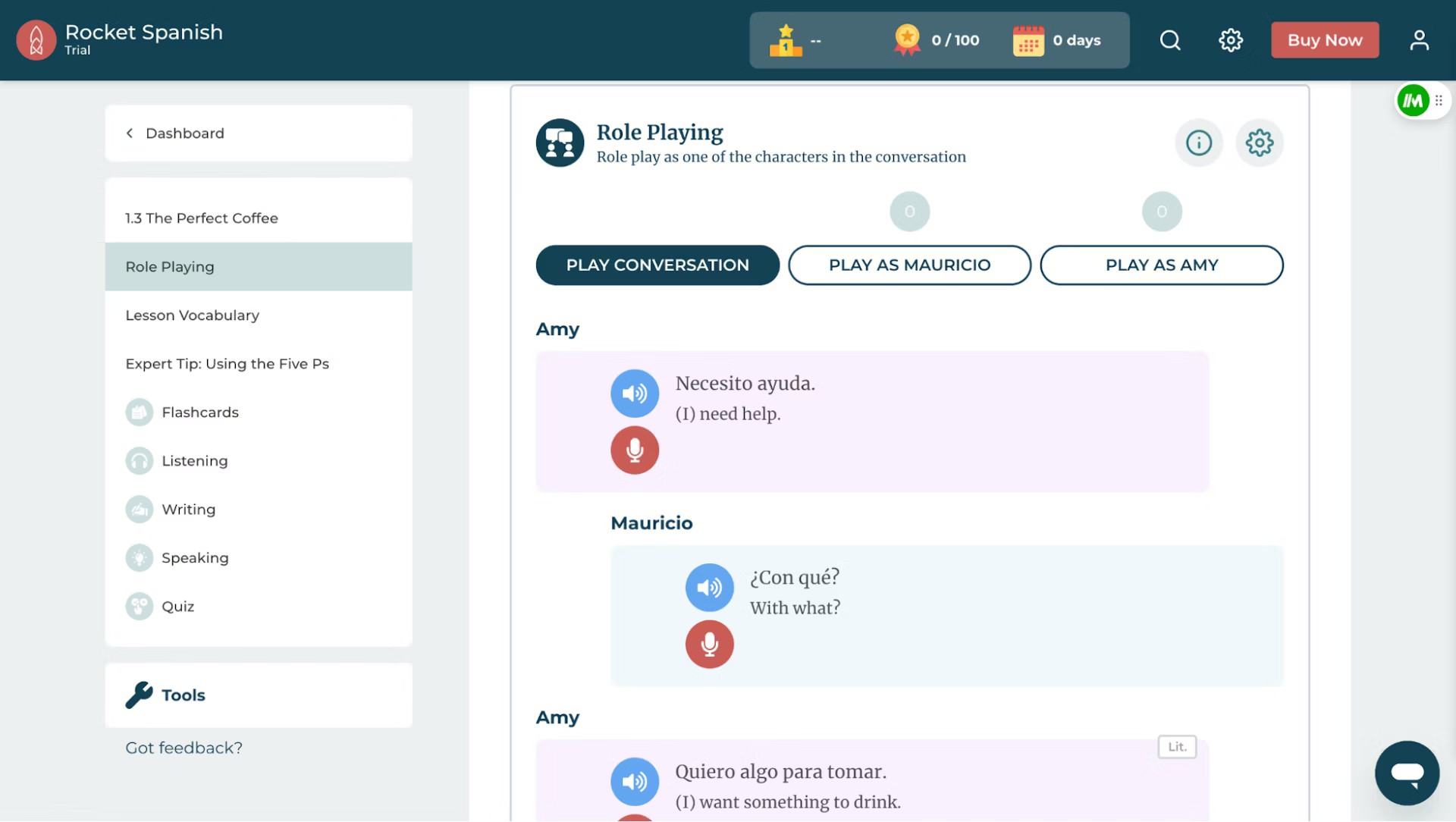
For instance, in the Spanish course, one lesson introduces a dialogue about ordering coffee. What impressed me was how they didn't just teach the expression but also explained the grammar rules behind the sentences.
The lessons progressively build on each other. As I kept going down the course, I found myself engaging in a surprisingly complex dialogue about planning a weekend trip, using vocabulary and grammar structures introduced in previous lessons. This scaffolding approach feels natural and effective.
However, I did notice some inconsistencies in difficulty progression. In some language courses, for example, there's a significant jump in complexity between Module 1 and Module 2, which might leave some learners feeling lost.
The "Language & Culture" lessons are a mixed bag. They offer clear, concise grammar explanations: I particularly appreciated the breakdown of the German case system in Level 2. But they can be dry, and I often found my attention wandering.
One area where Rocket Languages falls short is in developing advanced fluency. While the content is excellent for beginners and intermediate learners, I found the highest-level Rocket languages lessons in Spanish (my strongest second language) to be lacking in complexity. They don't quite prepare you for understanding rapid native speech or expressing nuanced ideas.
To illustrate, here's a quick breakdown of what you can achieve at each level in the Spanish course:
-
Level 1: Order food, ask for directions and introduce yourself
-
Level 2: Discuss your daily routine and give opinions on simple topics
-
Level 3: Describe past events, make plans, and engage in basic debates
Overall, Rocket Languages excels at building a solid foundation and getting learners to a comfortable conversational level. But for those aiming for true fluency, it should be seen as a stepping stone rather than a complete solution.
-
Motivating gamification features (points, leaderboards, streaks)
When it comes to keeping learners motivated, Rocket Languages has clearly put some thought into their approach. Their gamification system revolves around points, badges, and a leaderboard—pretty standard stuff in the language app world.
But here's where it gets interesting.
I noticed that completing a full lesson awards you significantly more points (around 2000) compared to individual activities (usually 2-10 points). This clever weighting encourages users to finish entire lessons rather than just pecking at bits and pieces. Smart move, Rocket.
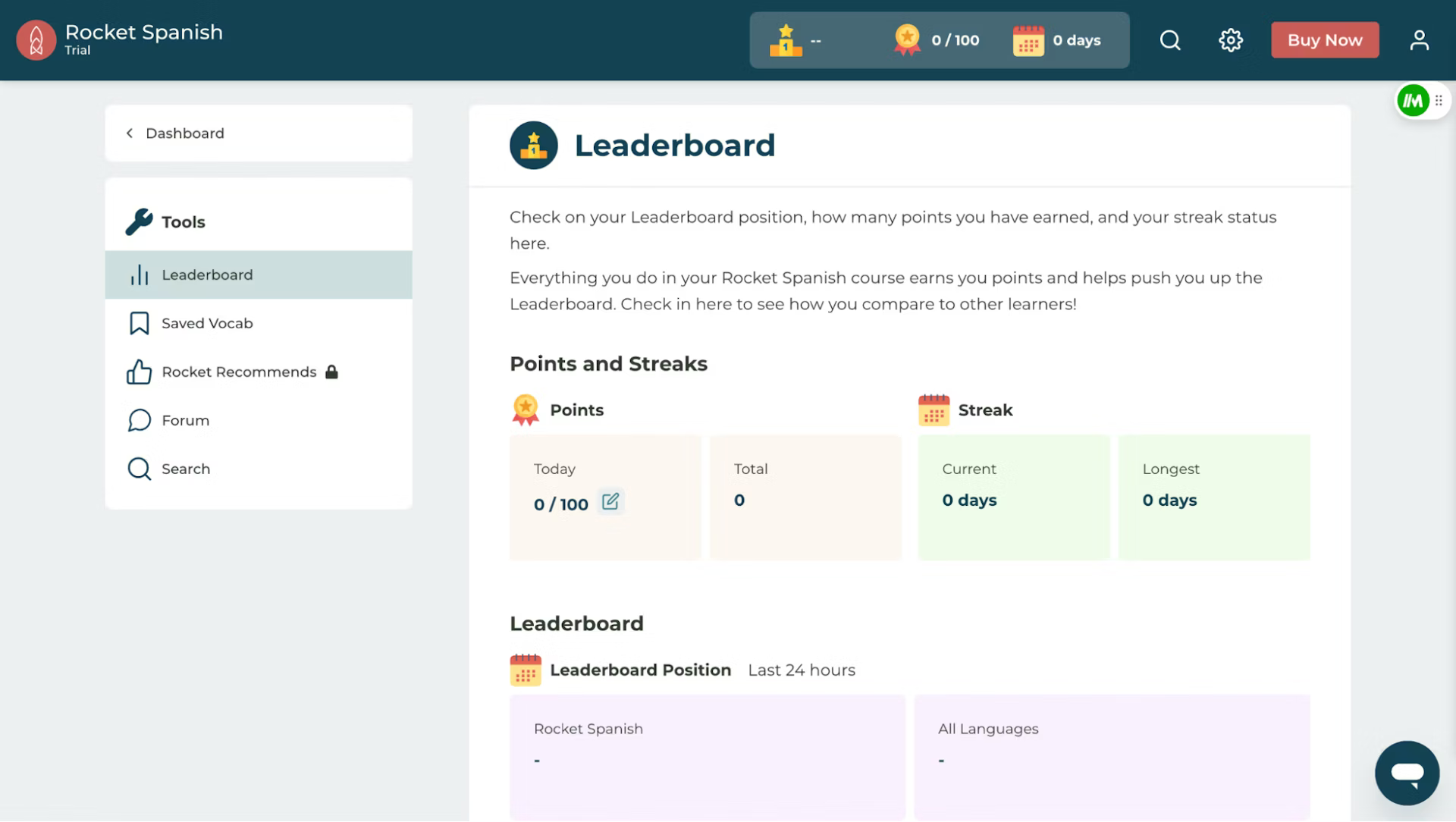
The streak feature, while not revolutionary, does its job well. I found myself oddly compelled to maintain my 14-day streak, even logging in for quick 5-minute sessions on busy days. It's simple and effective.
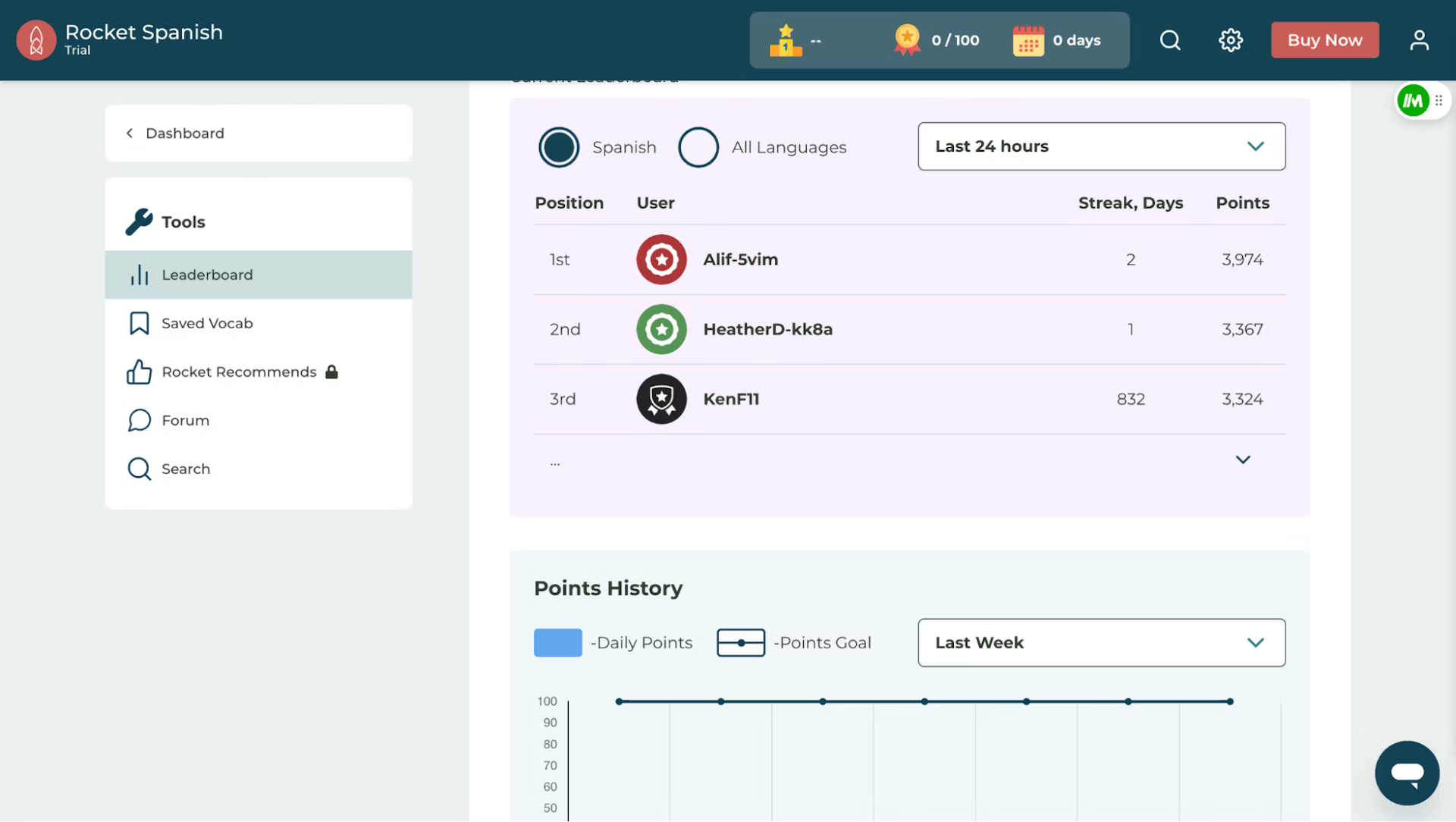
However, where Rocket Languages shines is in its adaptive learning. For example, in the German course, I noticed that after struggling with der/die/das articles, the system started peppering in more exercises focused on this area. This personalized touch kept me engaged and addressed my weak spots without feeling overwhelmed.
That said, I wished for more variety in the gamification elements. After a few weeks, earning another badge for "completing 5 audio lessons" started to lose its charm. A bit more creativity here - perhaps timed challenges or mini-games - could really elevate the engagement factor.
-
Downloadable audio lessons for offline learning
Each audio lesson is available as a separate MP3 file, easily downloadable with a single click. The file sizes are reasonably compact - most lessons are between 15-25 MB—making it feasible to store a significant portion of the course on your device without eating up too much storage.
The real value of this feature became apparent during my recent trip to rural Rwanda. With spotty internet connectivity, I was able to continue my Spanish studies uninterrupted, listening to lessons during long train rides and reviewing them in the evenings.
The quality of the downloadable audio is excellent, maintaining the clarity of native speaker pronunciations even at lower bitrates. This is crucial for languages with subtle sound distinctions, like the difference between 'l' and 'r' in Japanese.
One aspect I particularly appreciate is how the lessons are structured for audio-only learning. Unlike some programs that rely heavily on visual cues, Rocket Languages' audio lessons are self-contained. The hosts clearly explain concepts, spell out new words, and provide ample repetition, making it effective even without the accompanying text.
However, there's room for improvement. While the audio lessons are downloadable, other components, like the interactive exercises and flashcards, aren't available offline. This limits the depth of practice you can do without an internet connection.
Also, there's no built-in audio player within the app for offline use. You need to use your device's default music player, which means losing some of the app's features like easy looping of specific sections or in-app note-taking.
Rocket Languages Cons: Some areas of Rocket Languages that might put you off
As someone who's extensively used the platform, I've encountered a few issues that might be deal-breakers for some learners. Let's dive into these potential drawbacks:
The "Extra Testing" feature in Rocket Languages, while well-intentioned, falls short in several ways:
-
Repetitive Nature: After using this feature across multiple languages, I found it to be overly repetitive. It often regurgitates the same questions in slightly different formats, which quickly becomes tedious.
-
Lack of Depth: The questions tend to be surface-level, focusing primarily on vocabulary recall rather than testing deeper understanding or application of language concepts.
-
Insufficient Variety: There's a noticeable lack of variety in question types. Most are multiple-choice or simple fill-in-the-blank, which doesn't adequately prepare you for real-world language use.
-
Disconnect from Lesson Content: Often, the extra tests don't seem to align well with the specific content of the lessons they're attached to. For instance, in a German lesson about past tense, the extra test included questions about food vocabulary from several lessons prior.
-
No Adaptive Learning: Unlike some competitors, the extra testing doesn't adapt to your strengths and weaknesses. It doesn't focus more on areas where you struggle, missing an opportunity for targeted improvement.
Removal of PDF lesson note downloads
A significant downgrade in recent updates has been the removal of downloadable PDF lesson notes. This change impacts the learning experience in several ways:
-
Limited Offline Access: Without downloadable PDFs, you're reliant on internet access to review lesson content. This is particularly problematic for learners who like to study in areas with poor connectivity.
-
Reduced Flexibility in Study Methods: Many learners, myself included, benefit from having physical notes to review. The absence of printable PDFs removes this study option, forcing everyone into a digital-only approach.
-
Difficulty in Quick Reference: PDFs allowed for easy searching and quick reference of specific points. The current system requires navigating through the app or website, which is less efficient.
-
Impact on Long-term Retention: Writing notes by hand has been shown to improve retention. The removal of easily printable lesson summaries takes away this valuable study method.
-
Challenges for Visual Learners: Some learners benefit greatly from visual aids and the ability to annotate physical copies. This change particularly disadvantages these types of learners.
Occasional technical glitches with voice recognition
While the Google Web Speech API generally works well, I've encountered some frustrating glitches:
-
Inconsistent Performance: Sometimes, the voice recognition works flawlessly, but other times it fails to register clear speech. This inconsistency can be very frustrating, especially when you're sure you've pronounced something correctly.
-
Background Noise Sensitivity: In less-than-ideal environments (like a cafe or with a fan running), the system often picks up background noise, leading to inaccurate results.
-
Dialect Difficulties: For languages with multiple dialects, like Spanish, the system sometimes struggles with variations in pronunciation. It seems to favor certain accents over others, which can be discouraging for learners.
-
Lag in Response: Occasionally, there's a noticeable lag between speaking and seeing the recognition results. This delay can disrupt the flow of practice sessions.
-
Browser Compatibility Issues: I've noticed that the voice recognition feature works better in some browsers than others. This inconsistency across platforms can be annoying if you switch between devices.
While these issues don't render the feature unusable, they can be disruptive to the learning process, especially for beginners who are still building confidence in their pronunciation.
Get French Classes: A better alternative to Rocket Languages for French learners
Rocket Languages offers a solid program for learning French, but Get French Classes provides a more comprehensive and personalized approach that will be better suited for many French learners. Here's how Get French Classes stands out:

Immersive learning experience
Get French Classes offers a truly immersive French learning experience that goes beyond what Rocket Languages provides.
The program combines video lessons, private tutoring, group classes, and daily practice exercises to create a multi-faceted approach that develops all language skills—speaking, listening, reading, and writing.
Unlike Rocket Languages, which primarily relies on audio lessons and basic exercises, Get French Classes builds its curriculum around practical, everyday French conversations and scenarios.
Our learners are exposed to useful phrases and expressions that French natives actually use, not just textbook French. This real-world focus is evident in the interactive video lessons, which feature native speakers in authentic situations.
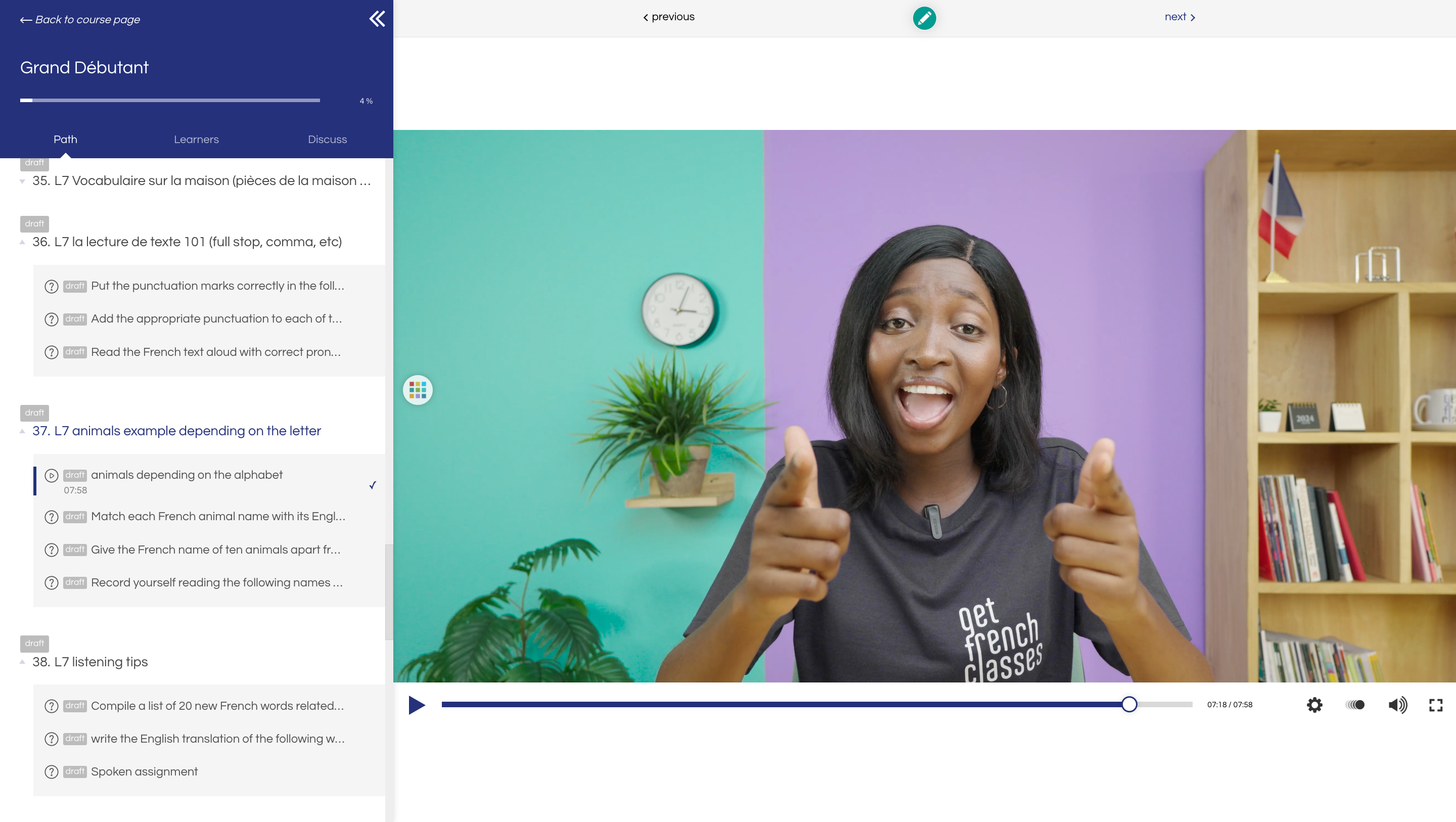
For example, a lesson on greetings doesn't just teach greeting vocabulary. It includes a section of a realistic greeting scenario with instructions on how to react depending on the settings and familiarities.
Learners then practice role-playing the scenario with their tutor, during the private classes, getting immediate feedback on their pronunciation and word choice.
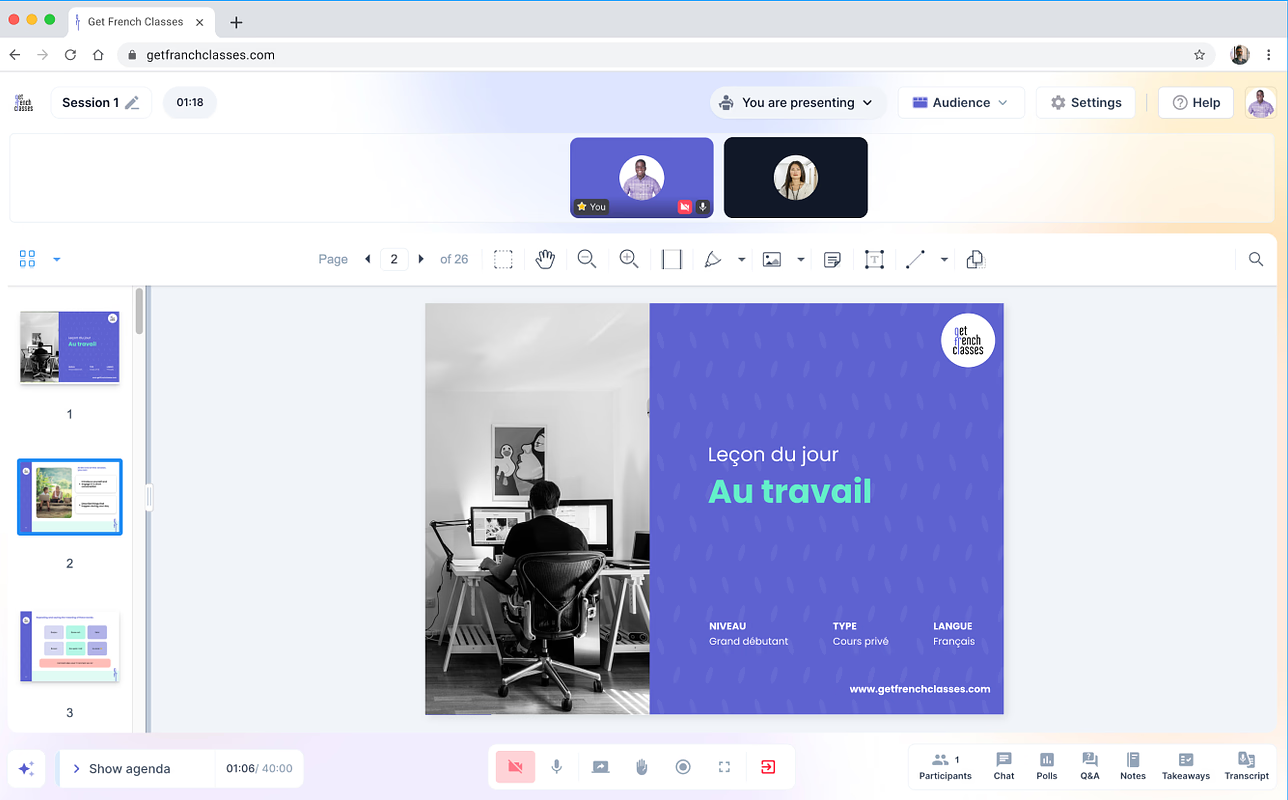
Perhaps most importantly, Get French Classes offers personalized instruction that Rocket Languages can't match. Learners are matched with tutors who have relevant experience in their field or interests.
A business professional learning French for work will be paired with a tutor with a background in international commerce, while a culinary enthusiast could work with someone knowledgeable about French cuisine.
This personalization keeps lessons engaging and relevant to each student's goals.
Accountability and habit-building
One of the biggest challenges in self-paced language learning is staying motivated and consistent. Get French Classes has built-in features to keep learners on track, addressing a key weakness of programs like Rocket Languages.
At the heart of this system is our accountability partner program.
Each learner is paired with another student at a similar level. These partners check in regularly, practice together, and motivate each other to stay consistent.
For instance, partners have a weekly call to practice the latest lesson's dialogue, then work together to complete a cultural research project for their next group class.
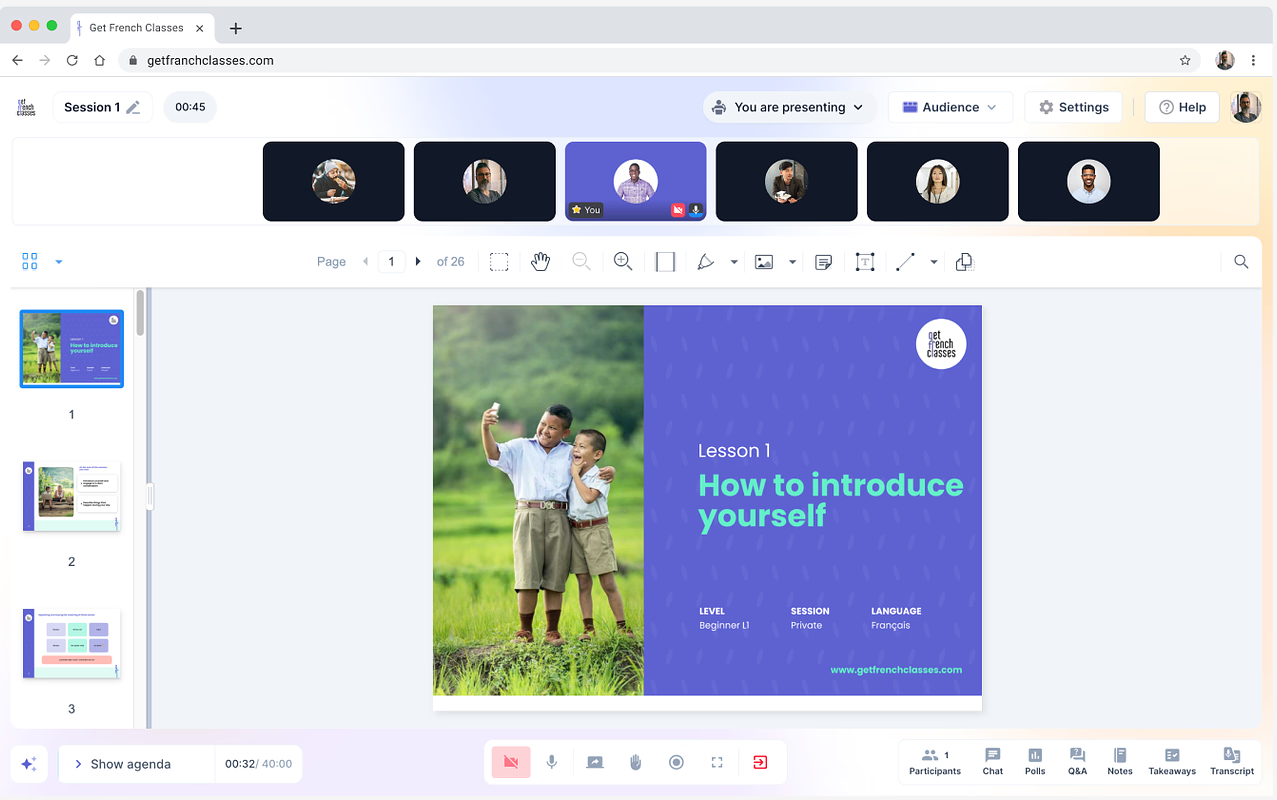
The platform also includes clear progress indicators, milestones, and badges to help learners visualize their advancement and stay motivated.
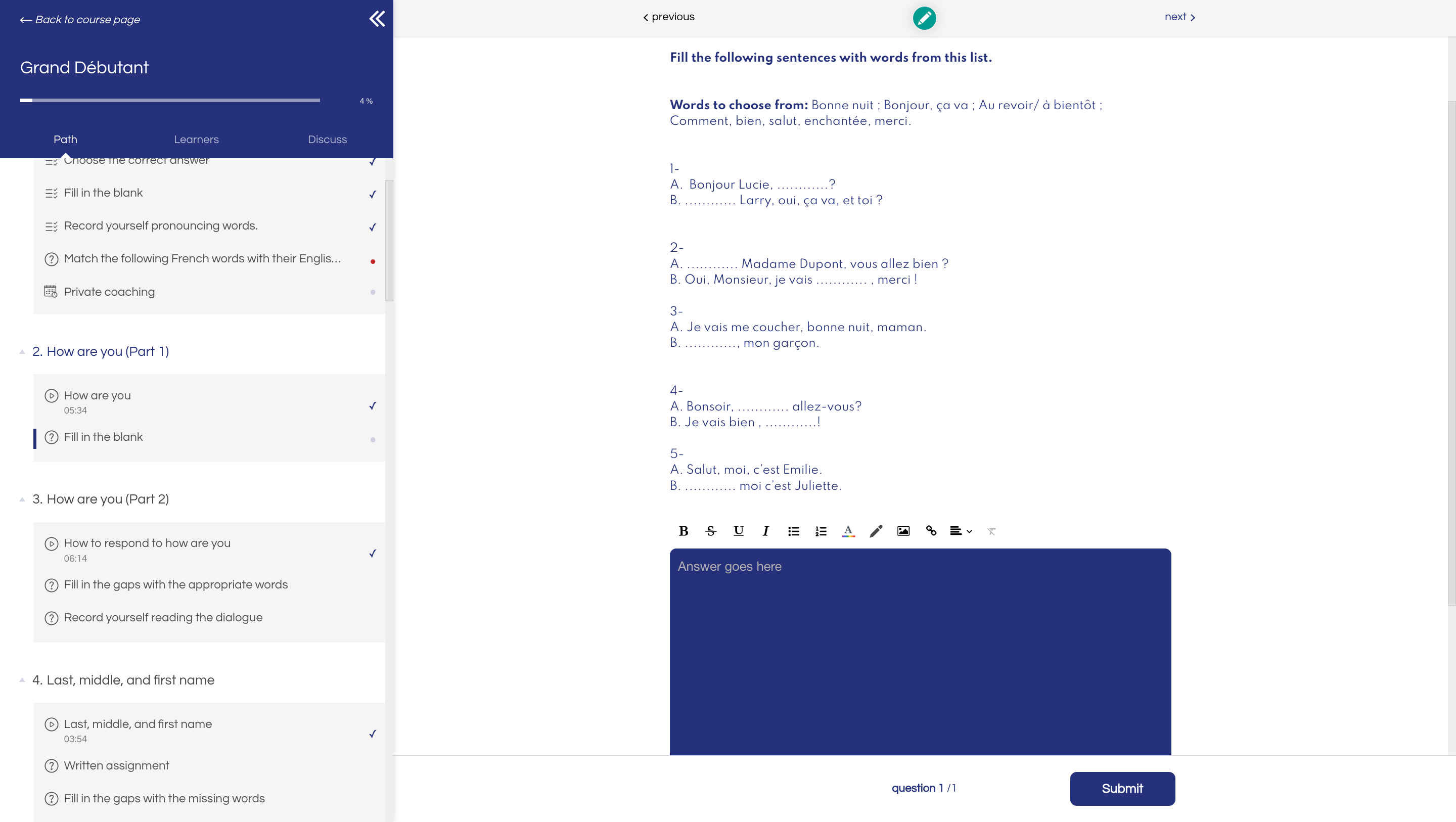
Unlike Rocket Languages, where it's easy to skip lessons or lose track of progress, Get French Classes requires the completion of both written and spoken assignments for each lesson before moving forward.
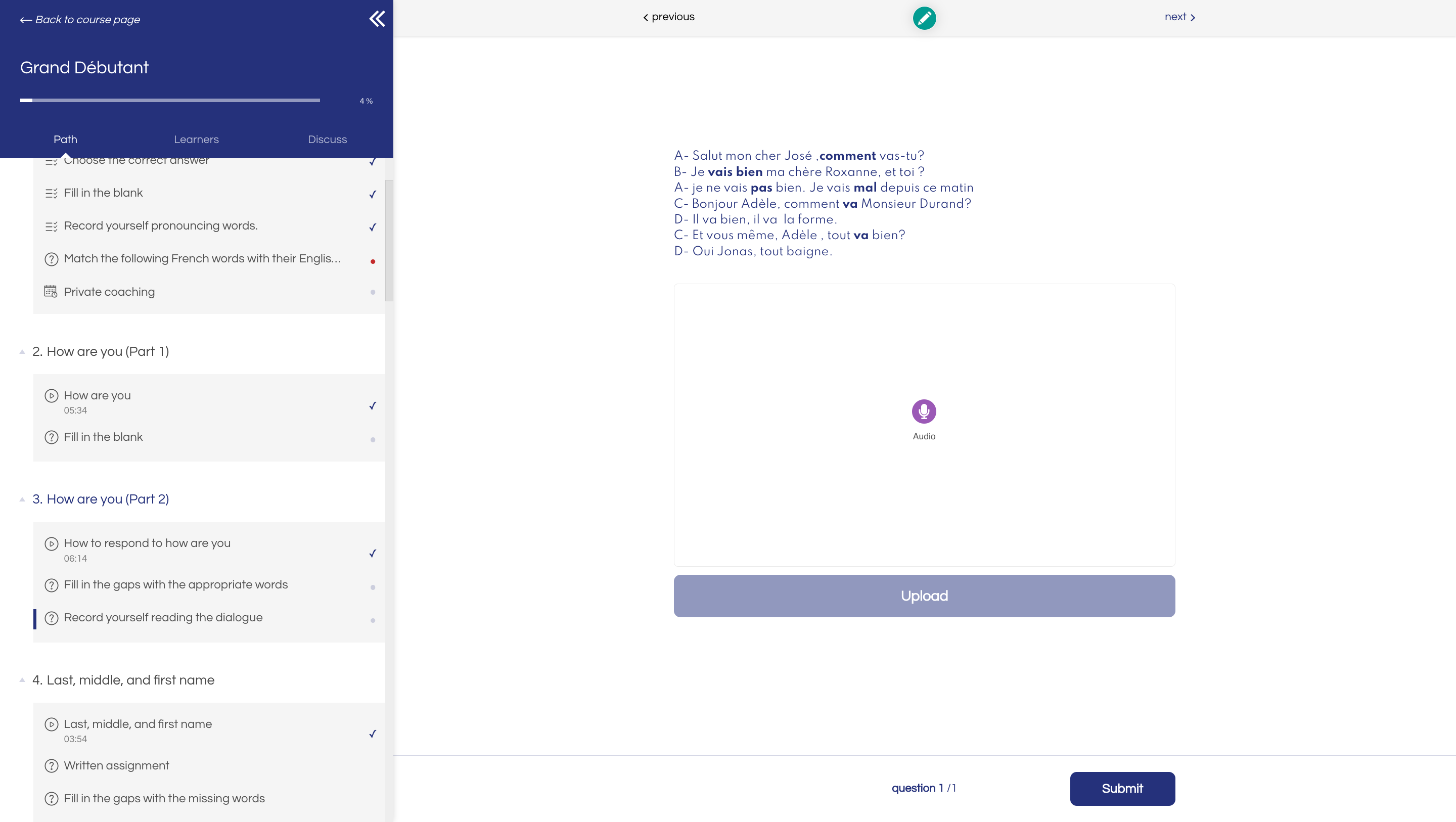
This ensures active engagement with the material, not just passive consumption.
Regular one-on-one sessions with tutors create a routine and give learners deadlines to work towards.
A typical week includes two private tutoring sessions, a group class, and daily short exercises. These could range from vocabulary drills to listening to French podcasts or completing brief writing prompts.
The program also fosters friendly competition and collaborative learning through weekly debates and monthly group projects.
Learners team up to create a French language podcast or compete to see who can maintain the longest streak of daily practice.
Here are what some of our happy learners say:

As a busy mom and professional, learning French has been complicated for me. But since I started learning with Get French Classes, I have seen my French improve FAST. Through the lessons, I not only get to practice every day, but I also have more opportunities than before. I can practice with my advisor, private tutor, and other learners like me.

What I like the most about the program is that all my tutors are native speakers. They do help me not only understand the French language, but also the culture and the nuances of some words and expressions. And mostly, the live sessions are engaging and fun.

I chose Get French Classes because their teaching materials and content are incredibly rich, going from everyday expressions to more specialized ones. I also get many opportunities to interact with tutors, and that has a huge impact on my fluency.
I've tried learning French on my own before, but nothing compares to this program. The combination of video lessons, live tutoring sessions, and group practice made learning French enjoyable and effective.
Is Rocket Languages Worth It?
Rocket Languages offers good value for money, especially during sales, with its one-time payment for lifetime access. It's well-suited for self-motivated learners who prefer a structured, comprehensive approach to language basics.
However, it has limitations in developing advanced conversation skills and may not be sufficient on its own for achieving fluency.
For French learners specifically, Get French Classes presents a more dynamic and effective alternative.
On top of providing structured lessons, Get French Classes offers personalized tutoring, interactive group sessions, and real-world conversation practice.
We built our platform to address the shortcomings of traditional language apps, focusing on practical communication skills and cultural immersion.
With Get French Classes, learners benefit from accountability features, customized learning paths, and a community of fellow French enthusiasts, making it a more comprehensive solution for those serious about mastering French. Here's what our learners say:

As a busy mom and professional, learning French has been complicated for me. But since I started learning with Get French Classes, I have seen my French improve FAST. Through the lessons, I not only get to practice every day, but I also have more opportunities than before. I can practice with my advisor, private tutor, and other learners like me.

What I like the most about the program is that all my tutors are native speakers. They do help me not only understand the French language, but also the culture and the nuances of some words and expressions. And mostly, the live sessions are engaging and fun.

I chose Get French Classes because their teaching materials and content are incredibly rich, going from everyday expressions to more specialized ones. I also get many opportunities to interact with tutors, and that has a huge impact on my fluency.
I've tried learning French on my own before, but nothing compares to this program. The combination of video lessons, live tutoring sessions, and group practice made learning French enjoyable and effective.
